Denis Vibert was born Jan. 19, 1919 in Jersey and was the third son of Thomas and Florence Vibert nee Touzel. He was educated at the H.M.S. Worcester Thames Nautical Training College and London University.
He was the only person to escape to England by boat to england during the occupation of the Channel Islands by the Germans during world was two. Below is a summary of his exploits at that time.
The unsuccessful attempt
In November 1940 the first attempt was made to escape. It was an effort by rowing, and in view of the necessity of being out of sight of Guernsey in daylight he had planned to row from Jersey to certain rocks south of Guernsey on the first night, with the intention of hiding there during the succeeding day. This first part of the adventure was successful, but unfortunately the wind changed the next day and it was impossible to continue the journey the following night. He waited four days but the conditions did not change. During this time he developed influenza, and finally he decided to abandon the attempt and return to Jersey. The return was not uneventful as his boat was wrecked and he had to swim a quarter of a mile to shore. His absence had not been discovered by the Germans.
The successful effort
Early in 1941 the Germans gave a week’s notice ordering all boats to be brought to certain harbours in order to have them under control. It was necessary, therefore, to obtain some craft at that time. He managed to obtain a small 8 foot boat called the Ragamuffin which he hid at his house. Two outboard motors were obtained and the necessary petrol was procured by siphoning it from a German lorry. The boat and equipment were duly smuggled to a prepared place on the beach.
The attempt was made on a night in the autumn of this year. Conditions were satisfactory and a successful get-away was made. The first bit of bad luck occurred just after leaving; two German “E” boats passed about a hundred yards away and although he was not seen the wash half filled his boat making his little store of food uneatable. He rowed some four miles out to sea before making use of the outboard motor. He drank all his water supply that night.
By day-break he was some fifteen miles west of Guernsey and he proceeded to replenish the petrol tank. At this stage the sea was rather choppy and water got into the engine making it unserviceable. He then proceeded to fit the spare engine but had the misfortune to let it fall into the sea.
He rowed for two days, sleeping part of the nights. He had no food or water. After two days he altered course, fearing the currents would take him too far west: instead he headed for Weymouth. It was at this point that Lieutenant Commander Frederick Thoughton on HMS Brocklesby spotted him, and brought him aboard. He was questioned in Plymouth, then by MI5 in London to establish he was not a German agent. Fortunately a fellow Jerseyman, Denys Richardson was on hand to vouch for him. He then joined his parents in Berkshire, before joining the RAF. A notice appeared in the Jersey Evening Post on 10 November 1941, requesting any information as to the whereabouts of Dennis Vibert. The notice as shown below was signed on behald of C.J. Cumong, the Constable of St. Helier, but was issued by order of the German Feldgendarmerie. A copy of hid ID card is also shown .
In the Royal Air Force, he served as a bomber pilot flying Wellingtons as part of the Atlantic Coastal Command. He met and married his wife, Ruth Meynell in Charlottetown, Prince Edward Island Canada in 1943. After the war, he studied at the Quebec Provincial School of Design.When Denis finished school, the couple purchased their Sullivan home. It had no electricity or running water but they were sure they could make it comfortable. And they did.
Since 1950, Denis and his wife, Ruth, ran Pine Tree Kiln out of a barn next to their home. Denis was the potter and Ruth ran the gallery. It all started in 1948, when they built a pottery studio in the large red barn attached to their house. Several years later they converted the second floor of the barn into a gallery and shop.
The Viberts sold a mixture of utility dinner sets and individual pieces. Many pieces and sets were unique, because Denis Vibert used a variety of glazes and two kilns, one gas and one wood. He hads trademarked many of his utility pieces by keeping parts of them free of glaze to let the colors and textures of the clay show through. Some serving dishes bear hand-painted designs of birds, flowers or landscapes.
Vibert pottery is highly prized in homes throughout Maine and the country. But the potter himself iwas matter-of-fact about his livelihood. In an interview he said :-
“I don’t think the only important aspect of pottery is artistic expression. Making pottery simply gives people a chance to live where they want and to “be their own master.” And potters make “objects that people can use and enjoy in their homes,” “Those two aspects of the crafts are really the most important.”
He began making his pieces using clay from a pit across the road from his home on Route 1.”It’s not terribly good for making clay,” he said. “But it worked for quite a while.”
In the beginning, he worked alone making the utility sets and single pieces, but soon he was joined by other potters. Some helped out by rolling the clay or placing it on molds, while others were master potters who made the sets alongside him.
Despite his down-to-earth stance, and unbeknownst to most of his customers, he had several of his pieces in art shows across the country, including exhibits at the DeCordova Museum and the Worcester Museum in Massachusetts. One piece even traveled for a year with a Smithsonian show of contemporary pottery.
The Viberts had no idea how many pieces of pottery have passed through their hands in the more then 50 years they had been in business. “We have made many pots,” said Denis. “But the first 50,000 were the most fun.”
Ruth attributed their longevity to her husband’s creativity. “He had a lot of different ideas,” she said. “That’s what helps us last so long.”
Although Denis tried for years to get his customers to call his business Pine Tree Kiln, people continued to refer to it as “Vibert’s.” “When you’ve been here so long,” he said, “people get to know your name.”
Here a few pictures of him and Ruth in their later years in Canada :-
Denis passed away Sept. 25, 2004, at a Bangor, Canada hospital surrounded by his family. he was 85.
His friends and family in Jersey gathered to recall the man and boy they knew in a memorial service that echoed the funeral service at his home in Maine on 2 October 2004.
‘It is apt that Den’s boat Ragamuffin is here today in the church to symbolise not only those epic three days alone in the Channel but the journey on which he has embarked,’ said the Dean of Jersey, the Very Rev John Seaford, who led the memorial service and spoke the opening words, a quote from Ambrose Redman: ‘Courage is not the absence of fear, but rather the judgment that something else is more important than fear.’
As part of the Liberation celebrations in in Jersey in 2005, a rowing boat left Jersey and was rowed across the English Channel, following Denis Vibert’s escape route. The boat remains as a further memorial of that escape.

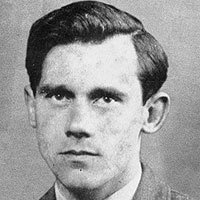
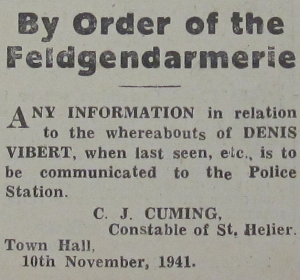
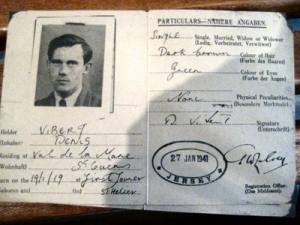
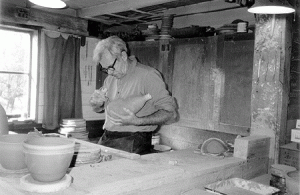
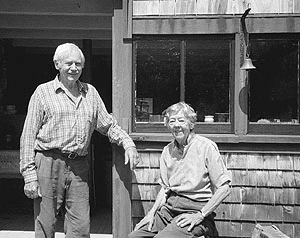
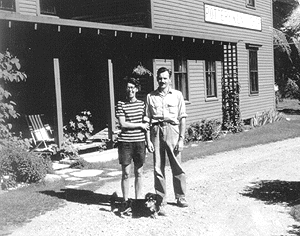
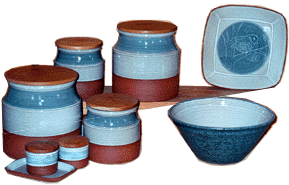
Hello. I have just visited the Jersey underground hospital and was given s copy of Denis’ Jersey ID card. A coincidence is that we share our birthday!
What a story to uncover. A true adventurer and hero.
Kindest regards
Steve Hogarty
I JUST BOUGHT MY FIRST PIECE OF POTTERY SIGNED VIBERT. After checking out the name I came across very interesting life story. Thank you so much for sharing .